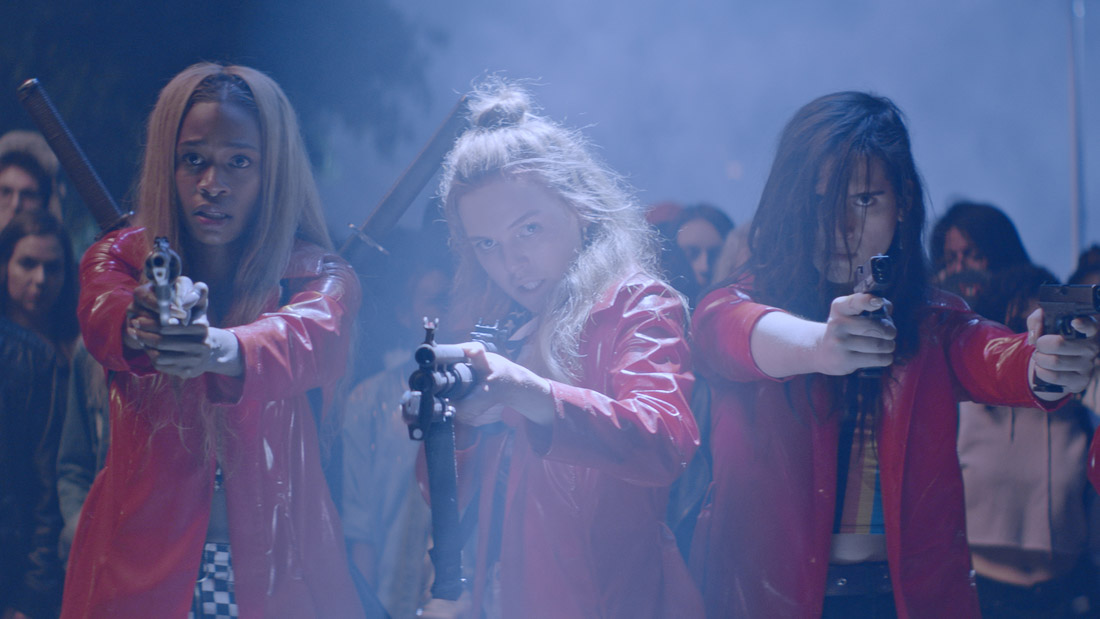The Midnight program of Sundance has borne witness to the premieres of “Saw,” “The Babadook,” “We Are What We Are,” and several other horror flicks that went on to find loyal audiences. The last couple years has been a little light on quality in this program, but 2018 looked incredibly strong on paper and produced two of the biggest stories of Sundance ’18: A24 picked up Ari Aster’s unforgettable “Hereditary” before the festival even began, and Neon spent the most money to date ($10 million) on a film that writer/director Sam Levinson told audiences no one wanted to let him make. Now he’s got an undeniable success story on his hands, although its price tag helped make it one of the more divisive flicks of this year’s fest too. Everyone wanted to see what exactly Neon was willing to open the vault for and varying opinions made “Assassination Nation” one of the most talked about films of the festival. This is a good thing for Neon—when people talk about a movie like this one, positively or negatively, it’s doing something right.
The obvious pitch for “Assassination Nation” is “Mean Girls” meets “The Purge” for the era of social media. It’s a film that opens with a montage of “trigger warnings”—things that the film contains that could upset you. And that abrasive, in-your-face tone continues for the next two hours to such a degree that some people are going to simply hate the mood of this film overall. It’s designed to confront people, to pound its ideas into the audience with the force of a sledgehammer. That confrontational intensity often makes for a film that people love or hate. For a Sundance that felt a little muted this year—there were almost no comedies or thrillers, with most films playing out as serious dramas—I found it refreshing to at least see something willing to shout, scream, jump, and push its way into the public consciousness. It doesn’t all work—a film that takes such a buckshot approach to satire never can be—but there’s enough filmmaking verve on display here to make me like it.
Lily (Odessa Young) goes to high school in the late ‘10s. In other words, she lives in a nightmarish haze of texting, social media posts, and constant judgement. One thing Levinson captures is how much this world in which teenagers are communicating through their phones is something of a nightmare before his film even gets violent. Lily and her three besties (Suki Waterhouse, Hari Nef, Abra) find themselves the target of scorn when someone in town starts releasing hacked private information from all of the adults in their town named, of course, Salem. Suddenly, everyone’s secrets are public, and that leads to total chaos. And I don’t mean the kind of chaos in your typical cinematic warning against social media—I mean some George Miller shit. Levinson posits that we are one hacking away from complete cultural meltdown. He may not be wrong.
Levinson can’t always keep a grip on his tone, but there are a few incredibly well-constructed sequences in “Assassination Nation”—including a home invasion shot through the home’s windows in an unbroken shot and a bloody showdown in a bathroom. It’s a film that sparks to life enough to forgive when it sags. Most of all, the young cast, especially Young and Nef, throw themselves entirely into this insanity, keeping viewers engaged through the film’s more ridiculous chapters. It’s a film that takes a bit too long to get going, but hold on once it does.

Much as Levinson’s film doesn’t work at all without the committed performances of his leads, ‘Never Goin’ Back” lives and dies on the fearlessness of its leading ladies, Maia Mitchell and Cami Morrone. It’s essentially a stoner comedy with two young ladies in the parts that would have once been played by Cheech and Chong, which only takes a movie so far but this is the kind of after-a-dorm-party movie that could easily find a cult following over the years.
Mitchell and Morrone play Angela and Jessie, BFFs who are about to have a very bad day. They can barely get enough money together to keep the water on or buy toilet paper, but they’re planning a birthday trip to get away from their depressing lives as waitresses. These are people who go to the grocery store for samples to replace a meal or stand in a freezer to cool off. “Back” has echoes of “American Honey” in the way to features people struggling on the fringe but willing to sing-along to hip-hop instead of wallowing in their situation. And there’s something to the idea that the minute these two people finally splurge to do something for themselves, all hell breaks loose.
“Never Goin’ Back” is regularly bright and funny, mostly due to the great performances from Mitchell and Morrone, but the script needed another couple passes. There are few too many shit jokes and attempts at stoner humor for my taste, although if my life was currently a little closer to Angela and Jessie’s than I could see myself being more forgiving of the jokes that fall flat here. And Mitchell and Morrone are almost good enough to get me there anyway.

Jonathan Watson’s “Arizona” starts so promisingly. It’s beautifully cast and opens with a great premise, turning the housing crisis into a John Carpenter-esque nightmare. And yet it never goes where you want it to go. It’s a film that feels almost completely director-less, containing no real formal or narrative choices that give it a consistent tone. It’s a frustrating film because one can see what it could have been if a filmmaker had known how to guide it with some daring choices or confident direction.
A surprisingly muted Danny McBride plays Sonny, a man with nothing left to lose. He is going through a bad divorce and is way underwater on his house. One day, Sonny goes to his realtor (a cameo by Seth Rogen) to get some recompense and, well, things go wrong, and another realtor, Cassie (Rosemarie Dewitt), sees it. Suddenly, Sonny is sliding down a hill of criminal behavior, including murder and kidnapping, and Cassie is along for the ride.
Using the housing crisis to launch a night of violence is a good idea but Watson never finds the right tone for this thing. It’s a thriller that’s not thrilling and a comedy that’s not funny. Shockingly, McBride even seems to be toned down a bit, which would work if “Arizona” was a more serious take but it’s not quite that either. We needed McBride turned up to 11 for this movie. It’s a film that kept pushing me out of enjoying it, and one I practically forgot before the festival was even over.

My least favorite film of Sundance 2018 is the final Midnight program of this feature, the depressing “Summer of ’84,” a thriller that’s drawn comparisons to “Stranger Things” and “It,” but really only makes those look so much better. As you might imagine with that title, this is a nostalgia-heavy thriller that makes “Stranger Things” look downright subtle in the way it uses its time period (Ewoks! Gremlins! Reebok!). It’s “The Goldbergs” of movies about serial killers. And if the lazy writing isn’t bugging you, the truly lackluster performances will get the job done. There’s no point in piling on the movie, so I’ll just say that this is a movie about four kids who become convinced their neighbor is a serial killer that only reminds you of superior films and TV shows. But “Summer of ’84” really becomes something loathsome in its final act, as it moves to an ending it hasn’t really earned at all. You’ll have to really miss the mid-‘80s to make it through it.












